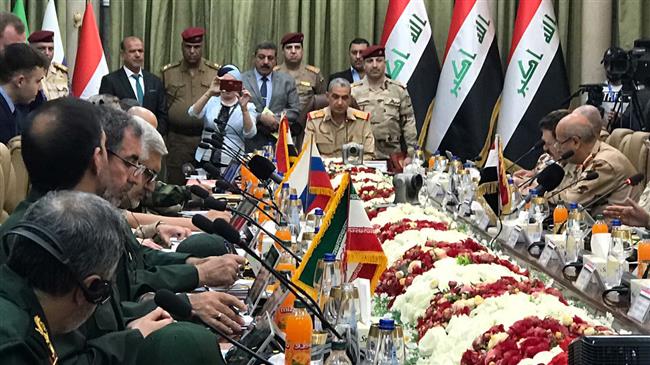
RNA - The commanders from the four countries, which have joint operation rooms to coordinate the fight against the Daesh terror group, attended the conference on Saturday.
The Iraqi Defense Ministry said it had received delegations led by deputy chiefs of staff to "strengthen cooperation and coordination in terms of security and intelligence among these countries."
Lieutenant General Salim Harba, head of the Syrian delegation to the conference, said that the four countries are in agreement over tackling terrorism, which is a threat to humanity.
He also warned that US proxies were planning a new chemical attack in Syria to pin the blame on Damascus and justify a new aggression against the Arab country.
At the request of Damascus, Iran has been offering advisory military assistance to the Syrian government fighting an all-out militancy.
According to Press TV, Russia, too, has military advisers in the Arab country, besides carrying out aerial bombardments on behalf of the Syrian government.
The support by Tehran and Moscow has enabled the Syrian army to speed up its gains on various fronts against Takfiri militants.
Daesh started its campaign of terror in Iraq and Syria in 2014, occupying territory in the two Arab countries and establishing a self-proclaimed “caliphate.”
The Takfiri group was gradually driven out of all the land it had occupied in Iraq and Syria and both countries announced Daesh’s territorial collapse in December 2017.
Daesh remnants, however, are now believed to be hiding in the Iraqi-Syrian border region.
A recent report by the United Nations estimates that between 20,000 and 30,000 Daesh members are still holed up in Iraq and Syria.
Iraq risks Daesh re-emergence
On Saturday, a study warned that extremist groups such as Daesh may re-emerge in Iraq if the country fails to tackle a critical drought and other climate-related issues.
The study, conducted by the Expert Working Group on Climate-Related Security Risks, was presented to the UN Security Council.
“The combination of its hydrological limitations, increasing temperatures and extreme weather events puts pressure on basic resources and undermines livelihood security for Iraq’s population,” the report said.
"Failure to monitor and manage these climate-related risks will increase the risk of Daesh and post-Daesh terrorist groups gaining support and regaining strength within resource-constrained communities."
In a purported audio recording in Arabic released last month, Daesh ringleader Ibrahim al-Samarrai, aka Abu Bakr al-Baghdadi, called on his followers to keep up their terror attacks.
847/940